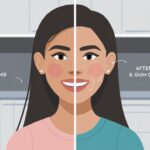If you’ve been experiencing symptoms such as bleeding gums, swollen gums, or loose teeth, you might be dealing with a serious oral health issue known as advanced periodontitis or periodontal disease. URBN Dental is here to provide the most effective gum disease treatment options to help you regain your oral health. In this article, we delve into the various treatments available for periodontal disease, from nonsurgical therapies to treat gum disease to surgical interventions for advanced periodontal disease. We offer the most effective dental treatment for periodontal disease to help you regain optimal gingival health.
What is Gum Disease (Periodontal Disease)?
Gum disease, also known as periodontal disease, is a chronic inflammatory condition that affects the gum tissue and supporting structures of your teeth. It starts as gingivitis, characterized by gum inflammation and bleeding when you brush or floss your teeth. If left untreated, gingivitis can progress into advanced periodontitis, leading to severe damage to the gums and bone. Several risk factors contribute to the development of gum disease, including poor oral hygiene, hormonal changes, health conditions, and genetic predisposition.
Gum Disease Risk Factors:
- Poor Oral Hygiene: Inadequate brushing and flossing habits allow plaque to accumulate on teeth and gums, increasing the risk of gum disease.
- Tobacco Use: Smoking or using tobacco products significantly raises the risk of gum disease by compromising blood flow to the gums and impairing the immune system’s ability to fight infections.
- Hormonal Changes: Hormonal fluctuations during puberty, pregnancy, and menopause can make gums more susceptible to inflammation and gum disease.
- Health Conditions: Certain medical conditions, such as diabetes and autoimmune diseases, can affect the body’s ability to fight infections, including gum infections.
- Genetic Predisposition: A family history of gum disease may increase your susceptibility to developing the condition.
- Poor Nutrition: A diet lacking in essential nutrients, particularly vitamin C, can weaken the immune system and contribute to gum disease.
- Stress: Chronic stress can impair the body’s ability to fight infections, making it easier for gum disease to develop and progress.
- Medications: Some medications, such as antihypertensive drugs and certain anticonvulsants, can cause gum tissue enlargement, increasing the risk of gum disease.
- Substance Abuse: The use of recreational drugs can have detrimental effects on oral health, contributing to gum disease and other dental issues.
- Systemic Factors: Conditions that compromise the immune system, such as cancer or HIV/AIDS, can increase the risk of gum infections.
- Inadequate Dental Care: Skipping routine dental check-ups and cleanings can allow gum disease to progress unnoticed and untreated.
- Alcohol Consumption: Excessive alcohol consumption can dehydrate the body and decrease saliva production, making it easier for bacteria to thrive in the mouth.
- Teeth Grinding (Bruxism): Habitual teeth grinding can cause gum recession and damage the supportive structures of teeth, increasing the risk of gum disease.
- Environmental Factors: Exposure to environmental pollutants and toxins can also contribute to gum disease.
Nonsurgical Treatments for Gum Disease:
- Dental Hygiene and Education: The first step in treating gum disease involves improving your oral hygiene practices. Regular brushing with fluoride toothpaste, flossing, and using an antibacterial mouthwash can help reduce plaque buildup and control harmful bacteria in your mouth. Your dentist or periodontist can provide guidance on proper oral hygiene techniques during routine dental visits.
- Scaling and Root Planing: This nonsurgical procedure involves deep cleaning of the tooth roots and removal of plaque and tartar buildup below the gum line. Scaling and root planing help eliminate the source of infection and encourage gum tissue to heal.
- Pocket Reduction Surgery: In cases where gum pockets have formed due to the progression of gum disease, pocket reduction surgery may be necessary. During this procedure, the periodontist will access the affected areas and remove the diseased tissue. This helps in reducing the depth of the pockets and promotes gum tissue regeneration.
- Laser Periodontal Therapy: An advanced and minimally invasive option for gum disease treatment is laser periodontal therapy. Using lasers, your periodontist can target and remove damaged tissue while promoting the regeneration of healthy gums and bone. This technique is less painful and leads to faster recovery compared to traditional surgical treatments.
Surgical Treatments for Advanced Gum Disease:
- Bone Grafting: In cases where bone loss has occurred due to advanced gum disease, bone grafting may be required. Your periodontist can perform bone grafting to restore lost bone by using either your bone (autogenous graft) or synthetic bone materials. This procedure provides a stable foundation for your teeth.
- Soft Tissue Grafts: Gum recession often accompanies advanced periodontitis, leading to lost gum tissue and exposure of tooth roots. Soft tissue grafts involve taking tissue from another part of your mouth or using synthetic materials to cover exposed roots, prevent further recession, and improve the aesthetics of your smile.
- Guided Tissue Regeneration: This surgical technique involves the use of membranes and tissue stimulating proteins to encourage the regeneration of both gum tissue and bone. Guided tissue regeneration can be effective in treating severe periodontitis and restoring the health of your teeth and gums.
- Flap Surgery: Flap surgery is a more extensive surgical procedure performed to access the roots of your teeth and clean thoroughly beneath the gum line. It may involve reshaping bone and tissue to reduce pocket depth and promote healing.
The Consequences of Untreated Gum Disease
Ignoring the warning signs and failing to seek treatment for advanced gum disease can have severe consequences. Untreated gum disease can lead to tooth loss, as the supporting structures of the teeth deteriorate. Additionally, it is important to note that gum disease is not limited to oral health; it has been linked to various systemic health conditions, including heart disease.
Tips to Prevent Gum Disease:
- Maintain good oral hygiene practices by brushing, flossing, and using mouthwash daily.
- Attend routine dental visits for professional cleanings and check-ups.
- Be aware of the risk factors, such as hormonal changes and health conditions, and discuss them with your dentist.
- Avoid smoking or using tobacco products.
- Consume a balanced diet rich in fruits and vegetables.
- Manage stress, as it can affect your overall health, including your oral health.
Visit URBN Dental for Periodontal Disease Treatment
Gum disease, especially when it reaches an advanced stage, should not be taken lightly. Timely treatment and proper management are essential to prevent further damage and maintain your oral health. URBN Dental is dedicated to providing you with the best gum disease treatment options, whether through nonsurgical therapies or surgical interventions. If you’re experiencing symptoms of gum disease or have concerns about your oral health, don’t hesitate to reach out to us at one of our convenient locations in Houston, including Uptown Houston, Midtown Houston, Montrose, City Center, Katy, East River, and Houston Heights. We are here to help you achieve and maintain a healthy smile.https://urbndental.com/texas/houston-dental-services/
Source:
Periodontal disease activity. (1992).















